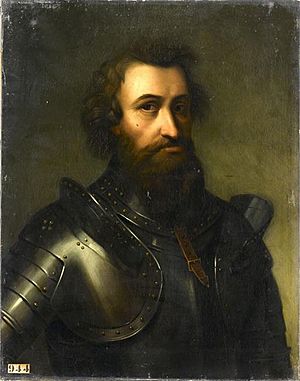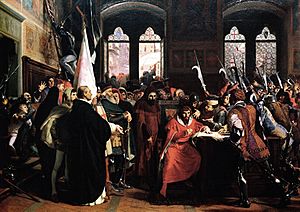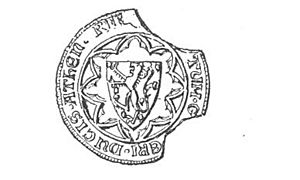Walter VI, Count of Brienne facts for kids
Walter VI of Brienne (born around 1304 – died September 19, 1356) was a French nobleman and a crusader. He held important titles like the count of Brienne in France, and the counts of Conversano and Lecce in southern Italy. He also claimed the title of Duke of Athens in Frankish Greece.
Quick facts for kids
Walter VI
|
|
|---|---|
| Count of Brienne | |

Portrait by Luigi Rubio, 1834.
|
|
| Born | c. 1304 |
| Died | 19 September 1356 (aged 51–52) Poitiers, France |
| Offices | Constable of France |
| Spouse(s) | Jeanne of Brienne |
| Issue | Jeanne Marguerite |
| Father | Walter V, Count of Brienne |
| Mother | Joanna of Châtillon |
Contents
Walter VI of Brienne's Story
His Early Life in Italy
Walter was the son of Count Walter V of Brienne, who was also the Duke of Athens. His mother was Jeanne de Châtillon. Walter's grandfather was Count Hugh of Brienne. This meant Walter was set to inherit a lot of land and titles across the Mediterranean Sea.
Walter's father died in a battle in 1311. After this, Walter became the Count of Brienne, Lecce, and Conversano. However, a group called the Catalan Company had taken over most of the Duchy of Athens. This was a big problem for Walter. He spent much of his life trying to get back this land that belonged to his family.
Walter mostly lived in Italy and France. He left his lands in Argos and Nauplia (in Greece) to be managed by others. His mother, Jeanne, fought hard against the Catalans while Walter was young. But her efforts didn't win back much land and made them poorer.
To make his position stronger, Walter married Beatrice in 1325. She was the niece of King Robert of Naples. King Robert was a powerful ruler in Italy. At this time, the city of Florence asked King Robert for help. They wanted him to protect their interests in Italy. So, they chose his son, Charles, to rule Florence for ten years. Walter became a helper for Charles for a few months in 1325.
Fighting the Catalans in Greece
After 1321, Walter often said he would go to Greece to get back the Duchy of Athens. But he didn't have enough money. Also, he had duties to the King of Naples that kept him busy in Italy. In 1328, he even made a short peace agreement with the Catalans.
So, it wasn't until 1330 that he made a serious effort. In June 1330, Pope John XXII supported Walter's plan for a crusade. A crusade was a religious war. The Pope asked church leaders in Italy and Greece to preach about fighting the Catalans. Soon after, King Robert of Naples also supported the crusade. He allowed his knights to join.
Walter sailed from Brindisi in August 1331. He first attacked some other areas in Greece. He made them recognize King Robert as their ruler. He also took the island of Leucas and the castle of Vonitsa for himself.
From there, he tried to invade the Duchy of Athens. But his plan failed. The Catalans avoided fighting him directly. They stayed safe behind the walls of Thebes and Athens. Walter didn't have enough soldiers to defeat them. He also didn't have enough money to keep fighting a long war. The local Greek people did not support him either. By the summer of 1332, it was clear his trip had failed. Walter returned to Brindisi with even more debt.
In his new Greek lands of Leucas and Vonitsa, Walter first put French officers in charge. Later, in 1343, he made Graziano Zorzi the governor of Leucas. Zorzi was a Venetian who had helped pay for Walter's trip. In 1355, Walter gave Leucas and Vonitsa to Zorzi as a gift.
Ruling Florence
Walter also spent time managing his lands in France. In 1339, he was the King's representative in a region called Thiérache. His first wife died in 1340. He returned to Italy in 1342. At that time, the rich merchants who ruled Florence asked him to govern their city.
Since 1339, Florence had faced a serious money problem. English banks owed a lot of money to Florentine banks. Also, Florence had spent a huge amount of money trying to take over the nearby city of Lucca. The rich people of Florence hoped a foreign ruler could solve their money problems. They found help in Walter of Brienne.
The ruling class invited Walter to rule for a short time. But the ordinary people were tired of their old leaders. They unexpectedly declared Walter their ruler for life.
Walter VI ruled like a dictator. He ignored or went against the wishes of the very merchants who had brought him to power. He made strict new money rules for the people of Florence. These included a flat tax and delaying when the city would pay back loans from rich citizens. These rules made the Florentines angry. But they also helped fix the money crisis that had been going on for years.
After only ten months, Walter's rule was ended by a secret plan. Walter VI was forced to leave his position. He barely escaped Florence with his life.
Later Life and Death
In 1344, Walter married Jeanne. She was the daughter of Raoul I of Brienne, Count of Eu. They had two daughters, Jeanne and Marguerite. But both of them died young. Since he had no children who lived, it was clear that his sister's children would inherit his lands and claims.
Walter was made Constable of France in 1356. This was a very high military position. In this role, he died on September 19, 1356, at the Battle of Poitiers. His sister Isabella and her sons took over his titles and claims. After Walter VI died, his inheritance was divided. Sohier d'Enghien received the title of Duke of Athens and Count of Brienne. Jean became the Count of Lecce. Louis became the Count of Conversano. Guy received the Lordship of Argos and Nauplia.
Cultural Legacy
A character called the "Duke of Athens" appears in a famous old book called the Decameron. This character is one of the nine lovers of the Sultan of Babylon's daughter. This story is not historically true. But it is probably a funny reference to Walter VI. His short but unforgettable time as ruler of Florence happened less than ten years before the Decameron was written.
Images for kids
See also
 In Spanish: Gualterio VI de Brienne para niños
In Spanish: Gualterio VI de Brienne para niños





